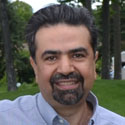Academic Editors
The following people constitute the Editorial Board of Academic Editors for PeerJ. These active academics are the Editors who seek peer reviewers, evaluate their responses, and make editorial decisions on each submission to the journal. Learn more about becoming an Editor.

Selina Khoo
Selina Khoo is an Associate Professor at the Faculty of Sports and Exercise Science, Universiti Malaya, Malaysia. Her research is related to participation of sports and physical activity for various populations, including older adults, persons with disabilities, women, and cancer survivors. This includes determining prevalence of physical activity, motives for participation, and interventions to increase physical activity. She also examines various aspects of disability sport, including accessibility, barriers and facilitators to participation, and media coverage. Selina is currently the country contact for Malaysia on the Global Observatory for Physical Activity and Vice President of the Asian Society for Adapted Physical Education and Exercise.

Shahryar F. Kianian
Research Leader, USDA-ARS Cereal Disease Laboratory. Previously, Professor of genetics and plant improvement, Department of Plant Sciences, North Dakota State University. Faculty of Cellular & Molecular Biology and Genomics interdisciplinary programs. Recipient of 2002 Yaggie Excellence in Research Award, 1989 Withaker Prize, and 1984 Gerard Award.

Rosemary E Kiernan
Research Director, CNRS. With an interest in understanding the mechanisms that contribute to the silencing or activation of mammalian genes.

Alexandre H Kihara
Alexandre H. Kihara is a Tenured Neuroscience Professor at Universidade Federal do ABC (UFABC). Dr. Kihara is one of the leader scientists in the growing field of electrical synapse plasticity. He is currently editor of scientific periodicals, including PLOS ONE and Scientific Reports. His studies led to pioneer reports on changes of electrical synapses in the visual system triggered by ambient light conditions. His research extends to multiple aspects related to cell communication mediated by connexins (Cx) and pannexins (Panx) and their functional roles in the development, plasticity, and degeneration of the nervous system. In his lab, data from brand new technologies such as recording and stimulation using high-density 4096 channels multielectrode arrays (HD MEA) are combined with tissue and cell culturing, calcium-activity imaging, molecular and cellular techniques, and specific methods developed to study neuronal and glial cell activity synchronization mediated by electrical synapses. In addition, he also has solid publication record and collaborations on miRNA, cell cycle control, stem cell biology, and apoptotic signaling.

Seung-Chul Kim
The Curator of the Ha Eun Herbarium (SKK) and Professor of Biological Sciences, Sungkyunkwan University, Korea. Program Director for the Korean Society of Plant Taxonomists.

Elizabeth G King
Assistant Professor of Biological Sciences, University of Missouri. The goal of our research is to explain the diversity of life history strategies among organisms. We primarily, though not exclusively, use insect model systems for our research.

Gary M King
Professor of microbial biology with extensive experience in numerous aspects of microbial ecology, biogeochemistry and ecophysiology. Elected fellow American Academy of Microbiology
Research interests include:
*Benthic marine biogeochemistry and animal-microbe interactions
* Biology, phylogeny and ecology of marine acorn worms (Hemichordata: Enteropneusta)
* Role of microorganisms in the dynamics of atmospheric trace gases (methane, carbon monoxide)
* Plant-microbe interactions, carbon cycling, trace gases in marine & freshwater ecosystems
* Microbial ecology of soils and community dynamics in volcanic soils
* Structure and function of lithotrophic bacterial communities
* Microbiology, physiology and ecology of aerobic CO-oxidizing bacteria

Judith Klumperman
Professor of Cell Biology, Chair of the Cell Biology Department University Medical Center (UMC) Utrecht, Head of the Cell Microscopy Center (CMC) of the UMC Utrecht.
Editorial boards of: Traffic, Histochemistry and Cell Biology, Biology of the Cell, Molecul

William A. Knaus
Director of Applied Genomics in Informatics at Center for Clinical Research in Informatics, NorthShore Research Institute Evanston, Illinois and Professor of Medicine University of Chicago. Former Evelyn Troup Hobson Professor & Founding Chair Department of Public Health Sciences, M.D., University of Virginia School of Medicine (1995-2012). Director ICU Research George Washington University School of Medicine & founder, former board member and CEO of Apache Medical Systems (Inc.) 1988-2000.

Fabien Knoll
Fabien Knoll is a Senior Research Fellow at the National Museum of Natural Sciences in Madrid, Spain. His research interests focus on the palaeobiology and evolution of archosaurs.

Mirjam Knörnschild
I am a Senior Scientist leading the Behavioral Ecology and Bioacoustics Lab at the Museum of Natural History in Berlin, Germany, and a Research Associate of the Smithsonian Tropical Research Institute in Panama. I hold extensive scientific expertise in acoustic communication, cognition, learning and social behavior of mammals, particularly bats. My research projects are highly interdisciplinary, incorporating behavioral ecology, genetics, neuroethology and biolinguistics. Most of my field work is conducted in the Neotropics and South Africa.
Mei-Chuan Ko
Professor in the Department of Psychiatry, University of Pittsburgh School of Medicine. My research interests involve behavioral neuropharmacology of pain and addiction, including 1) biological basis and pharmacotherapy for drug abuse and dependence and 2) neuropharmacological basis of therapeutics of analgesics and antipruritics.

